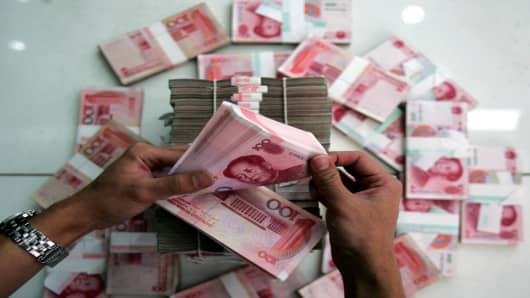Rob Subbaraman, chief Asia economist at Nomura, said capital outflows from a scaling back of U.S. monetary stimulus, anticipated later this year, is not as much of a concern for China as it is for other Asian countries.
"The amount of foreign hot money or short-term debt inflows into China is much smaller relative to the size of the economy compared to Malaysia, Indonesia, Thailand or a Korea," Subbaraman said. "China is going to be a $9 trillion economy this year, so the effects [of Fed tapering] are small."
China also has a "war chest" of foreign exchange reserves worth over $3.5 trillion to counter the impact of any sharp outflow of capital, said Subbaraman.
Other analysts said the risks of a liquidity squeeze in China if Fed tapering begins should not be overlooked.
(Read more: Fed tapering could mean instant problems for China)
"I think as a policymaker, of course, you wouldn't want to see a lot of volatility in the international financial market, and if tapering brings extra volatility, then it's bad," said Societe Generale China economist Wei Yao.
China's lenders suffered a liquidity squeeze in June, when money market rates briefly jumped as high as 30 percent, sparking concerns that tight credit conditions would spill over into the broader economy and exacerbate the slowdown in growth.
(Read more: China July flash HSBC PMI plunges to 11-month low)
Stronger dollar to help?
Encima Global's Malpass said there were some possible positive side effects from any Fed tapering for the Chinese economy.
For instance a pull-back in the Fed's asset-purchase program is expected to lead to a strong dollar, which should push commodity prices down, in turn benefiting China which is the world's top commodities consumer.
Malpass added that policymakers would also keep the yuan stable against the dollar, helping China "avoid the damage from the swing to currency weakness that weighs on investment in other emerging markets, for example Brazil."
The PBOC set the yuan's midpoint for trade higher at 6.1705 per the U.S. dollar on Monday in what traders saw as a sign of Beijing moving to keep the exchange rate stable. The yuan has strengthened about 1.5 percent against the greenback this year.
—By CNBC.com's Rajeshni Naidu-Ghelani; Follow her on Twitter @RajeshniNaidu.


